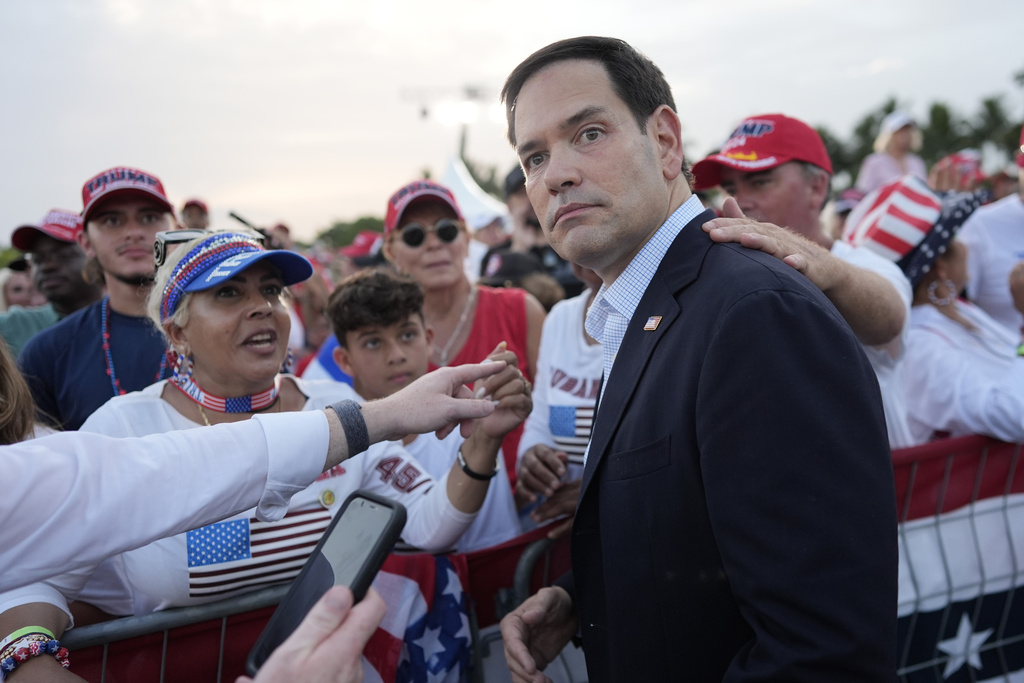President-elect Donald Trump is famously unconventional, but he made conventional picks for his two top foreign policy positions. That could be reassuring to American allies, while China and Iran have reasons to be wary.
Trump on Wednesday announced his choice of Sen. Marco Rubio for secretary of state. Two days earlier, he picked Rep. Mike Waltz for national security adviser.
Both men share Trump’s hard-line stance on China and Iran. They have shown themselves willing to adapt their foreign-policy positions to echo aspects of Trump’s more isolationist “America First” approach — a requirement for anyone serving under a president who demands absolute loyalty.
But both are fairly mainstream conservatives with foreign policy experience who have previously differed with Trump on Russia, NATO and other issues.
They’ve also been open to working with Democrats — a point underscored when Sen. Mark Warner, the Democratic chairman of the Senate Intelligence Committee, said Rubio would be a “strong voice for American interests” abroad.
Rubio and Waltz stand in contrast to some other national security selections. Trump named Pete Hegseth, a Fox News host untested on the global stage, as defense secretary. He picked a congresswoman with little foreign policy experience, Rep. Elise Stefanik, as ambassador to the United Nations. His choice for ambassador to Israel, former Arkansas Gov. Mike Huckabee, rejects the two-state solution to the conflict with Palestinians.
And U.S. allies may be relieved that Rubio was selected over Richard Grenell for secretary of state. Grenell is an ardent and combative Trump advocate and former diplomat and intelligence official, with a reputation for favoring autocratic strongmen abroad.
Rubio, a 14-year veteran of the Senate, is a senior member of the Senate Intelligence Committee and Foreign Relations Committee. His roots as the son of Cuban immigrants who worked as a bartender and a hotel maid after coming to the United States helped shape his tough positions on the leftist governments of Cuba and Venezuela.
While Trump has alarmed U.S. allies in Europe with his criticism of the NATO military alliance and praise of Russian President Vladimir Putin, whose war on Ukraine has galvanized European fears of Russian expansionism, Rubio was instrumental in the Senate in securing the U.S. position in NATO. He and Democratic Sen. Tim Kaine spearheaded legislation to bar any president from pulling the U.S. out of NATO without Senate approval or an act of Congress.
But Rubio, like Waltz in the House, has altered his public statements and legislative votes to more closely align with Trump’s criticism of the Biden administration’s backing of Ukraine as it battles invading Russian forces.
After early votes and supportive statements for Ukraine after Russia’s 2022 attack, Rubio and Waltz more recently voted against additional military aid to Ukraine. Rubio, like Trump, has increasingly stressed the need to end the war.
That’s in contrast to Ukraine supporters in both parties who say the U.S. must support Ukraine’s fight so it gets the best possible terms in any eventual cease-fire.
“I don’t think he (Trump) puts people in positions that are going to disagree with him. He wants people to be loyal, and I don’t think he’s looking for people that are going to challenge his beliefs,” said Kelly Grieco, a senior fellow at the Stimson Center, a Washington-based research institute. “So I think this is actually quite revealing, probably, of what the direction of U.S. policy will be, that it will be really hawkish on China in particular. And I think also on Iran.”
In China, analysts consider Rubio and Waltz to be “ultra-hawkish” toward Beijing and have taken to calling them part of the “Florida faction” in foreign policy, since both are from the state. Trump piled tariffs on China in his first term and promises more tariffs in his next one.
Rubio has argued for a more confrontational approach toward China, and he has been a vocal supporter of Taiwan, which Beijing sees as Chinese territory.
Rubio is known in China as the “anti-China vanguard” for his ideologically driven, anti-communism stance. He landed on Beijing’s blacklist in 2020 over his support for the minority Uyghurs in China’s far western region of Xinjiang and for Hong Kong activists. He co-chaired the bipartisan Congressional-Executive Commission on China, which focuses on human rights, and introduced and supported numerous bills on China’s rights issues.
The sanctions Beijing imposed on Rubio bar him from visiting the country. It’s unclear if China’s foreign minister will meet with him given the ban, or how the ban will otherwise affect his dealings with Chinese officials.
For his part, Waltz is a former Green Beret with combat tours in Afghanistan and the Middle East, a former defense policy director in the Pentagon, and a senior member of the House committees for armed services, intelligence and oversight.
He’s supported Western backing for Ukraine, saying doing nothing would invite further Russian aggression in Europe and draw in U.S. troops. But Waltz increasingly emphasizes the importance of Ukraine’s neighbors stepping up, saying Europeans should be spending as much on Ukraine’s defense as the United States does.
In a Nov. 2 article he co-wrote for The Economist, Waltz argued that China has benefited from the Biden administration’s failures to deter conflicts in Europe and in the Middle East.
In 2021, Waltz introduced a resolution calling on the U.S. Olympic Committee to withdraw from the 2022 Winter Games in Beijing.
“The world cannot legitimize the CCP’s acts of genocide in Xinjiang, destruction of the democratic rights of Hong Kong, and dangerous suppression of the coronavirus outbreak in Wuhan that cost lives by sending delegations to Beijing,” Waltz said then, referring to the Chinese Communist Party.
At a daily briefing in Beijing, Lin Jian, a spokesman for the Chinese foreign ministry, said China would not comment on Trump’s appointments.
Shen Dingli, a Shanghai-based international relations expert, noted the gap between Trump and his nominees on China. “Trump didn’t say China was an enemy during his first term and the presidential elections, but the hawkish officials he has appointed may believe China is an enemy to some extent,” Shen said.
Robert Manning, a China expert at the Stimson Center, said Trump is not as ideologically driven as Rubio but he raised concerns that Trump’s foreign policy could be more disruptive than President Joe Biden’s.
“I think some in the Trump camp want to get rid of the Communist Party of China, which I think is a fool’s errand, but nonetheless I think they’re more focused on a different endgame than achieving a stable balance of power,” he said.
(AP)












One Response
The other team consists of China, Russia, North Korea and Iran. In terms of conflicts, that means Taiwan, Philippines, Korea, Japan, Ukraine and Eastern Europe, and Eretz Yisrael.
Whom you appoint in the State Department is largely symbolic. They may speak softly or loudly, but what matters is the size of the stick they carry. That’s a function of the Defense Department, and part of the equation is is whether the president (such as Obama and Biden) is most concerned about whether the stick furthers domestic political aims (hint: purging generals and admirals for political reasons makes the stick seem smaller) or whether the president is working to build up the military and establish a bi-partisan consensus that would be need to fight a real war.